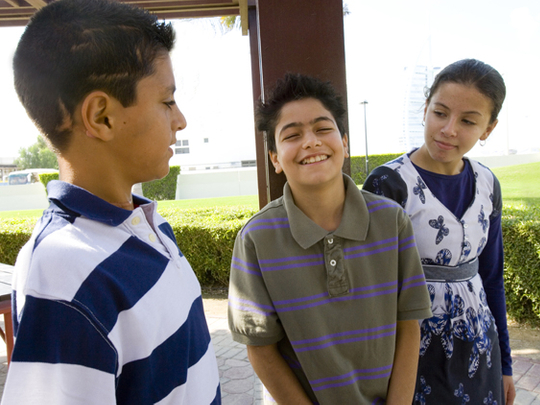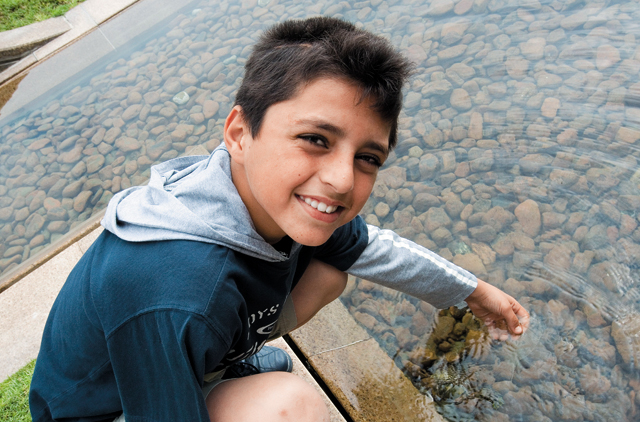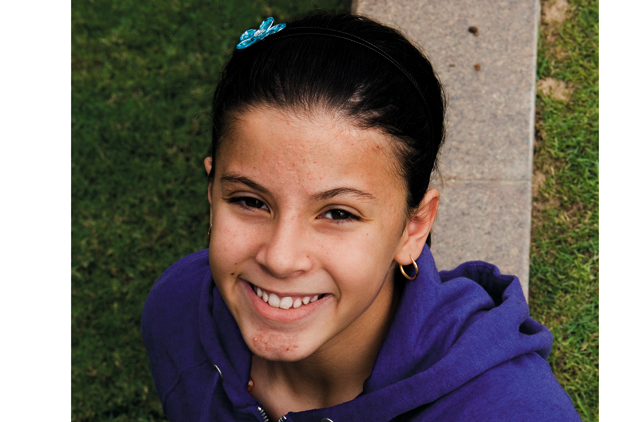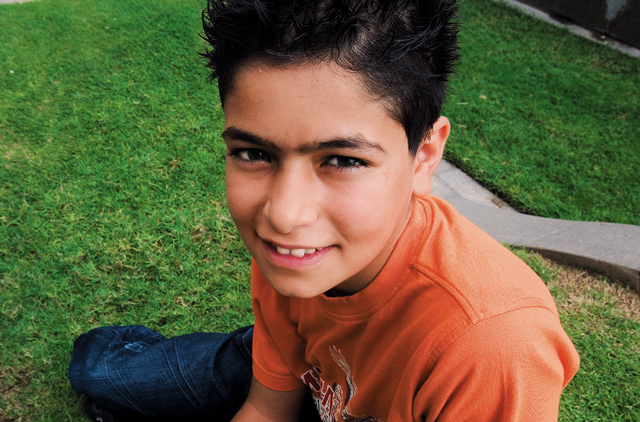
No phrase could sum up this experience more adequately than the one that springs to my mind now. Frank Slade, a retired army officer in the film Scent of a Woman, says, "[I have seen] boys like these, younger than these, their arms torn out, their legs ripped off. But there isn't nothin' like the sight of an amputated spirit. There is no prosthetic for that."
His words leap from my memory, forcing every syllable to line up neatly as I learn first-hand what it is like to meet those with real amputations, whose spirits remain intact.
The three children have travelled to Dubai through the non-profit charity organisation PCRF (Palestinian Children's Relief Fund) to have prosthetic limbs fitted. The organisation provides life-saving medical care to Arab children who are unable to receive aid in their hometowns due to economic and infrastructural limitations.
When I meet Yasmin Mustafa Al Najjar, 13, the air gently billows out her right boot-cut denim leg, the weight of the hem suspended from her hip, leaving a gap above the ground, while her crutches, appurtenances really, are thrown down on a grassy patch as she blithely hops from one grassy hill to another.
Nearby Mohammad Fawaz Saeed Sawafteh, 12, is too excited about his Sony camera to be coy in asking me to take his photo, propping himself on his crutches and against any background he thinks is interesting enough. While Ahmad Yousef Daraghmeh, 12, the rebel of the group, prefers to play on his own terms, especially if it involves water fixtures.
You'd think their physical limitations might deter them. Quite the opposite. They disport themselves with enough finesse to inspire more incredulity than a Lewis Carroll-style Mad Hatter's Tea Party. They prance around, their faces lit, articulating their joy in shrieks and joshing each other with riddles and jokes.
These aren't kids prone to megrims, brown studies or melancholic bouts due to their bodily failings. No. Just ask photographer Silvia Baron, and she would tell you a different story. She had a tough time getting the mischievous lot to pose for her.
Amidst staccato giggles and laughter they talk about how Najjar jumped higher on her one leg on the trampoline than the PCRF spokesperson Nadia Wehbe; where Daraghmeh with his muscular right arm beat the PCRF volunteer group at a bowling game; and how Sawafteh is so good at racing video games that no one could possibly beat him. The three children have to wait for a few weeks till their prosthetic limbs arrive. The charity hopes to make the waiting period enjoyable. Instead of putting them up in a hotel, Dubai-based families have been asked to host the children till their medical procedures, covered by the Shaikh Mohammed bin Rashid Al Maktoum Charitable Establishment, are carried out.
As I talk to these gregarious teenagers, who are clearly impervious to the lows of life, I feel a lump in my throat - for my own inadequacies and limitations. Life has stacked the cards against them, but they aren't bewailing their fate or sousing in grief. With nothing more than a smile backed by courage I see them extenuate their difficulties.
I don't want to commiserate their loss with them; I want to participate in their joy, so I high-five and back-slap and eat cookies from the same tin, chatting and exchanging tales.
These children have left their homes to complete parts of their beings that they lost in accidents, but all I see is their wholeness.
These are their stories…
"I want to be able to cycle"
Dressed in blue jeans with a floral pattern belt, glittery hair band and multi-coloured beaded necklace, Najjar is your typical teenager - spry, energetic and a touch impertinent.
She likes to hang out with friends, watch TV, shop and "just chill". She enjoys shopping, but the closest mall is half-an-hour and one checkpoint away from Bourin, a tiny agricultural village in the West Bank.
Her favourite garment is a pair of jeans and she says it will continue to be so despite the fact that a prosthetic limb wears away the fabric. She also likes sneakers and says she doesn't care much for heels.
As she speaks, she finishes her sentences with an exclamatory tone, and I can't help but notice her exuberance and the way her doe-like eyes dance with the mirth of youth. Her skin is milky, marmoreal, dotted with a few pimples.
"I am always in jeans unless it is Eid or a special occasion. Then I wear a dress or skirt," she says.
When she sits down, the billowed out right denim leg deflates. She picks it up and flips it insouciantly over her right leg, a gesture of crossing one's legs.
Najjar's leg was amputated above the knee when she was three-years-old. She was playing outside her house when a truck ran over her leg. She still remembers the instant when she was under the wheels. She has coped. She gets dressed by herself and takes the school bus to Bourin Primary School where she is a grade 8 student.
"My mum prepares breakfast. It takes me about 10 minutes to reach school. I love PE [physical education] class. During weekends I help my mum cook," she says. And by cooking she means "frying potatoes and eating them!"
Her three sisters and two brothers double up as playmates. (She is the third child.) Even among friends and schoolmates she says she doesn't find it difficult to lead a normal life. "The only difference is that I am slower. I miss running," she says.
But what she can do with speed is hop on one leg. She calls it running slowly. "I really want to learn to balance. I want to be able to cycle," says Najjar who wants to be a doctor so she can save victims of war.
After her second prosthetic is fitted, she hopes to learn to ride and be able to walk home.
"I beat them with a number 9 bowling ball"
Before I find out how he beat the entire PCRF volunteer group at a bowling game, I experience his strength from a left-handed handshake.
"I beat them with a number 9 bowling ball," says Daraghmeh, beaming. He vaunts on about how he also scored the highest when playing marbles and how he scored 4/5 in handwriting with his left hand. Barely 14 months ago he was right-handed.
The memory of the incident shadows his ruggedly handsome visage just as the tumescent and contusive scars outline his body. "I remember being airlifted in a helicopter," he says.
His arm was amputated after an accident involving a tractor in his village in Ein al-Beida in the West Bank. Daraghmeh, who loves aeroplanes and often looks skywards while travelling to count them in the air, says, "My first time in the sky was when I was taken to the hospital after my accident. My second time was when I travelled to Dubai."
Since then he has learnt several activities. If he is patient enough, he says he can tie his own shoelaces. "Or tuck the laces [into the shoes] if I am in a hurry." Like he did when he went bowling where he was too impatient to wait to start playing.
Back in the village, Daraghmeh, the second child among six, leads a simple life. A grade 6 student, he walks for about 2km to reach school. Recently he won an award for the highest score in maths. After school, he does his homework and helps his father, a farmer, to pack cardboard boxes of fruits and vegetables. And in his spare time he writes stories, draws and plays "basketball and tug-of-war" with his friends. But most, he loves the water. In Dubai, the PCRF volunteers took him to the beach and he has wanted to go back as often as they can take him. "I want to go to the beach every day. I dream about the beach and the waves. I can swim!" he says.
His first prosthetic arm will be a cosmetic one and will teach him to balance his body so his shoulder doesn't stoop. Once fitted he says he wants to learn boxing, and "to look better in photos".
"My right shoes are as good as new"
The last time Sawafteh played football was 18 months ago. He is a striker, playing nearest to the opposing team's goal - and scoring.
His favourite team is Barcelona. And he can't get enough of Ronaldinho. It is easy to see why he can barely rein in his excitement about being in the same country that hosted his team at the FIFA Club World Cup UAE 2009.
After his prosthetic limb is fitted, the second in two years, he wants to go back on the field. "I love football," he says, nodding his head enthusiastically, leaving every tuft of gelled hair intact. (His elder brother taught him to how to style his hair.)
Sawafteh as you might gather is a cool kid. His comely face is a riot of boyishness and mischief. Though taciturn among the three children, he is most voluble when it comes to football and music.
"I love Egyptian singer Tamer Hosni. I also like Turkish soap star Muhannad [from the Turkish soap Noor]," he says.
In his village Toubas he lives as Najjar and Daraghmeh described "like a king". "That is because I am the youngest and the only child to live at home with my mum. The rest of my eight brothers and sisters are married. My eldest brother is 37, but my 27-year-old brother takes care of us. After I complete my education I hope to start a business and own several companies one day," he says. At times, his birth order causes amusement instead of invidious comments. "I am an uncle! My niece is in college."
Sawafteh is in grade 7. Despite the accident that took place three years ago outside his uncle's house where a bus ran over him, he continues to perform his favourite activities. "I can swim and go horse riding," he says, admitting he prefers outdoor games to indoor, even though he is very good at racing video games.
While he doesn't miss anything in particular since his below-the-knee amputation, he'd like to make better use of his right shoes, which remain untouched when he buys a new pair. "My right shoes are as good as new."
Do you know of an individual, a group of people, a company or an organisation that is striving to make this world a better place? Every responsible, selfless act, however small or big, makes a difference. Write to Friday and tell us who these people are and what they do. We will bring you their stories in our weekly series, Making A Difference. You can email us at friday@gulfnews.com or to the pages editor at araj@gulfnews.com





